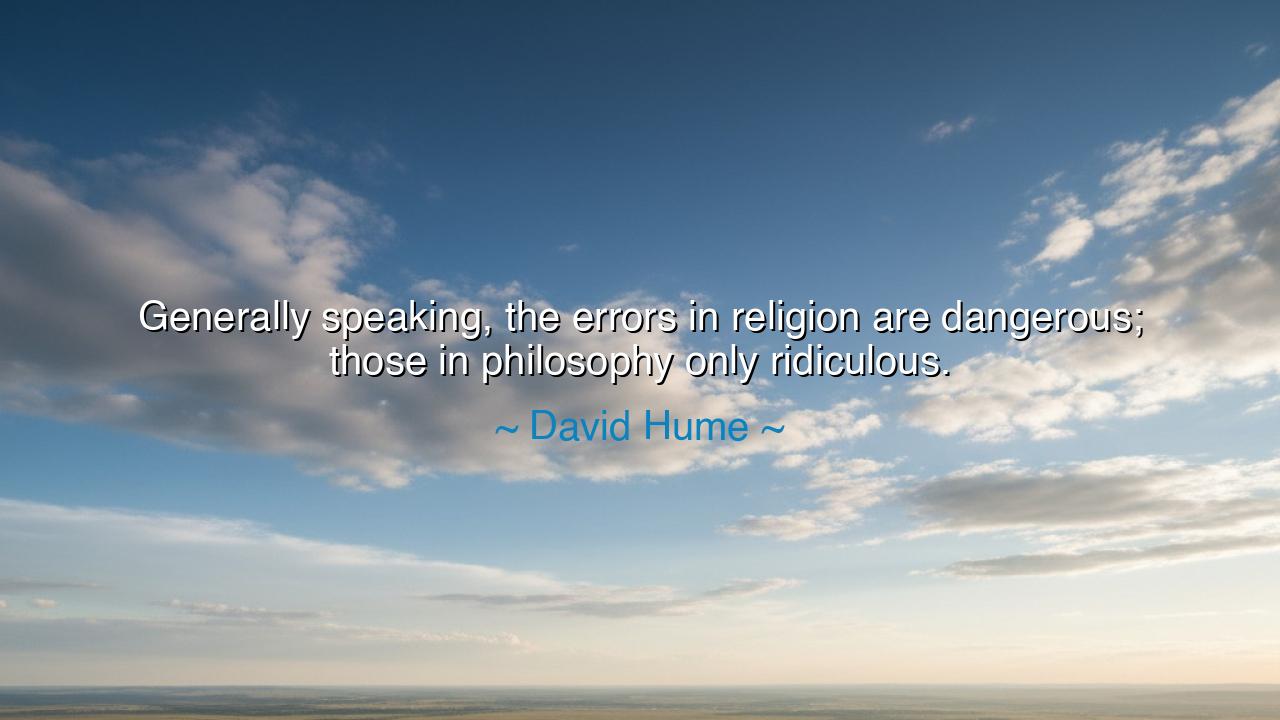
Generally speaking, the errors in religion are dangerous; those
Generally speaking, the errors in religion are dangerous; those in philosophy only ridiculous.






“Generally speaking, the errors in religion are dangerous; those in philosophy only ridiculous.” Thus spoke David Hume, the Scottish sage of the Enlightenment, whose calm reason and quiet irony illuminated the darkness of dogma. In these words lies both a warning and a plea—a warning against the power of belief when wielded without reason, and a plea for humility in the pursuit of truth. Hume, who spent his life questioning the foundations of knowledge and faith, saw that ideas are not all born equal: the falsehoods of thought may amuse or mislead, but the falsehoods of religion, when armed with authority, have the power to wound, enslave, and destroy.
To understand the heart of this quote, we must see Hume not as a cold skeptic, but as a lover of reason and peace. He lived in an age when religion held the minds of men in chains—when wars were fought in the name of heaven, when heretics were burned for questioning dogma, when the pulpit ruled not only the soul but the sword. Hume saw the terrible paradox that the teachings meant to bring salvation had, through ignorance and power, brought suffering. “Errors in religion,” he wrote, are dangerous because they do not remain confined to the mind—they spill into the world, shaping laws, judgments, and wars. The errors of philosophy, however, dwell mostly in the study, amusing the thinker but leaving the fields and cities unharmed.
Consider, for example, the long shadow of the Inquisition in medieval Europe. Men and women, accused of holding “false beliefs,” were tortured and executed in the name of purity. The fear of divine wrath drove human cruelty to its extremes. The “error” lay not in a misunderstanding of God’s will, but in the presumption that one mortal could claim to know it absolutely. Such is the danger Hume speaks of: when belief becomes infallible, it ceases to be faith and becomes tyranny. The errors of philosophers—those who argued whether reality was material or ideal, whether virtue was reason or pleasure—seemed laughable beside the pyres of the faithful. A mistaken philosopher might bore his students; a mistaken priest could condemn a nation.
And yet, Hume did not despise religion itself. He recognized that faith, when tempered with humility and compassion, can inspire goodness and meaning. His warning was not against God, but against certainty without evidence, against those who claim divine authority to rule over others. Philosophy, he said, invites doubt—it teaches men to question themselves, to laugh at their own follies. Religion, when corrupted by pride, forbids doubt and demands obedience. Thus, its errors become dangerous, for they cannot be corrected. “The philosopher,” Hume might have said, “errs alone; the zealot drags others with him.”
History offers endless echoes of this truth. In the twentieth century, the rise of totalitarian regimes—though often clothed in secular garb—followed the same pattern. Ideologies that replaced God with the State became new religions, demanding faith, punishing dissent, and proclaiming infallible truths. The gulags and concentration camps were built not by thinkers who doubted, but by believers who knew. Whether in the church or the party, the pattern is the same: when belief grows too sure of itself, it turns deadly. The errors of philosophy may make us foolish, but the errors of belief make us cruel.
And yet, Hume’s lesson is not despair, but balance. He reminds us that reason and faith must both be guided by humility. Philosophy without compassion becomes arrogance; religion without reason becomes fanaticism. Wisdom lies in knowing that our understanding, no matter how profound, is partial—that truth is larger than any single doctrine. To believe passionately and yet doubt humbly is the mark of a wise soul. “The fool,” said the ancients, “knows everything; the wise man knows that he knows nothing.”
So, my child of thought and spirit, take this teaching into your heart: beware of certainty. Let your beliefs—whether of heaven or earth—be tempered with kindness and curiosity. When you encounter difference, seek not to conquer but to understand. Study deeply, question bravely, but judge gently. Remember that truth needs no coercion, and that love is never born of fear.
For Hume’s words echo across the centuries as both warning and hope: “The errors in religion are dangerous; those in philosophy only ridiculous.” May you live, then, not as a prisoner of dogma but as a student of wonder. Let your faith, if you have it, be a bridge and not a weapon; let your reason be a lamp and not a blade. For the mind that seeks truth with humility and the heart that embraces others with compassion—these together form the only faith that cannot fall into error.






AAdministratorAdministrator
Welcome, honored guests. Please leave a comment, we will respond soon